Joint pain can be a huge burden, especially as we age. One of the most common issues people face as they approach their 50s is what some TCM practitioners call “fifty-year-old-shoulder.”
Also known as frozen shoulder or impingement syndrome, this shoulder pain can be extremely aggravating and keep you from doing the tasks and activities you once did with ease.
If you’re dealing with shoulder pain and want to avoid pain meds or surgery, Traditional Chinese Medicine (TCM) offers natural solutions that can help. But before we share the best Chinese herbs for shoulder pain relief, let’s first understand what “fifty-year-old-shoulder” is, why it happens, and who’s at risk.
What is “Fifty-Year-Old-Shoulder”?
“Fifty-year-old shoulder” can describe two different shoulder pain conditions known as impingement syndrome or frozen shoulder. It is a common condition among middle-aged individuals, particularly those over 50 (hence its nickname).
Both conditions can cause pain, stiffness, and limited range of motion in one or both shoulder joints. Understandably, they can also significantly affect your ability to take on normal daily activities, such as reaching up or lifting items, dressing, or even sleeping comfortably.
Impingement syndrome occurs when the rotator cuff tendons and bursa are compressed during shoulder movements. This causes pain and weakness, especially with overhead activities.
On the other hand, frozen shoulder (adhesive capsulitis) is characterized by severe stiffness and pain due to inflammation and tightening of the shoulder joint capsule, which leads to a significant loss of mobility.
While impingement syndrome typically results from overuse, arthritis, or structural abnormalities, frozen shoulder often develops without a clear cause. With impingement, we want to focus on reducing inflammation and relieving the compression; for frozen shoulders, we focus on decreasing pain (sometimes with warmth) and improving mobility.
Causes of Impingement Syndrome and Frozen Shoulder
- Age and Degeneration: As we age, our bones and joints naturally degenerate, leading to reduced bone mass density. This degeneration can cause calcification or irregular bone growths that irritate and inflame the surrounding tissues in the shoulder.
- Overuse and Repetitive Strain: Repetitive shoulder movements (which are common in sports like tennis and weightlifting) can strain and tear the shoulder tendons, leading to calcification and chronic pain.
- Rotator Cuff Tears: The rotator cuff, a group of muscles and tendons stabilizing the shoulder, can tear due to injury or wear and tear, causing pain and limiting movement.
- Old Injuries: Previous shoulder injuries that didn’t fully heal can lead to lingering issues and increase the risk of developing shoulder pain later in life.
Managing Shoulder Pain from a TCM Point of View
In TCM (Traditional Chinese Medicine) shoulder pain is often linked to imbalances in the body’s energy flow (Qi). This can happen for a number of reasons, but here are some of the most common underlying culprits for most people:
- Qi Stagnation
Qi stagnation is a blockage or disruption of the flow of Qi (energy) in the shoulder. When Qi doesn’t flow properly, it causes pain, limited mobility, and other issues. - Blood Stasis
Like qi stagnation, when blood doesn’t flow properly through the muscle, joints, or organ systems, it can cause pain – usually more severe than the pain caused by Qi stagnation. With shoulder pain, there can be poor circulation or stasis of blood in the affected area, which causes pain and stiffness. - Cold
Invasion of cold into the shoulder joint can cause contraction and restrict movement, which results in pain. This type of shoulder pain is often relieved with warmth, warm weather, and stretching or movement. - Dampness
Accumulation of dampness in the body can occur from diet, sedentary lifestyles, or the climate you live in. Dampness settles in the joints and muscles, which then leads to swelling and discomfort. Damp-type shoulder pain is often dull and comes with swelling or puffiness. - Heat
Excess heat in the body can lead to inflammation in the joints. This shows up as redness, swelling, and sharp pain that feels better with cold compresses or ice.
Managing these and other types of shoulder pain with TCM takes a holistic approach. Therapies like acupuncture, qigong, and tui na (medical massage) can help alleviate the pain and encourage healthy Qi and blood flow through the shoulder.
Herbal medicine is also a key part of an effective treatment plan. Internally, Chinese herbs can be taken to rebalance the underlying causes and support healthy joints and circulation, while topical herbal liniments, balms, and pain patches relieve pain on the spot and encourage faster healing.
Let’s take a look at some of the best Chinese herbs for managing your shoulder pain.
The Best Chinese Herbs for Shoulder Pain
TCM offers a range of herbal formulas specifically designed to address shoulder pain. These formulas aim to reduce inflammation, improve circulation, and alleviate pain naturally. Here are some commonly used herbs and formulas:
Du Huo Ji Sheng Tang
This is a widely used formula for all kinds of chronic pain in the joints, especially in older adults. It helps to dispel wind-dampness, tonify the organ systems that support joint health (Liver and Kidneys), and strengthen the tendons and bones.
Juan Bi Tang
Juan Bi Tang is a great choice for shoulder pain caused by wind-damp-cold invasion. You may have this type if your shoulder “acts up” in cold, windy weather, is worse in winter, or generally feels better with warmth. This formula warms the channels, promotes blood circulation, and alleviates pain.
Xiao Huo Luo Dan (Healthy Joint Combo)
This formula is best for pain due to cold and dampness “obstructing the channels” or blocking the free movement of Qi and blood. It works by dispersing cold, transforming dampness, and unblocking the meridians to restore healthy, pain-free movement.
-
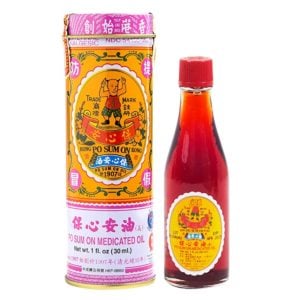 Po Sum On – External Analgesic – Pain Reliever
Starting at $14.99
Add to CartSelect options
This product has multiple variants. The options may be chosen on the product page
Po Sum On – External Analgesic – Pain Reliever
Starting at $14.99
Add to CartSelect options
This product has multiple variants. The options may be chosen on the product page
Po Sum On
Po Sum On is a traditional Chinese medicated oil that provides fast-acting relief from muscle and joint pain. It has powerful warming and invigorating effects that are best for cold or weak shoulders that feel better with warmth and massage.
Zheng Gu Shui
This popular Chinese herbal liniment is most often used for bone or joint pain relief, promoting healing of injuries, reducing swelling, and improving blood circulation. We love this version with the applicator brush – it makes applying the liniment to your opposite shoulder joint much easier!
Turmeric
While not a Chinese herbal formula itself, turmeric is a commonly used TCM medicinal that is included in herbal formulas or dietary therapy to relieve inflammation and pain. In TCM, it has a special affinity for the shoulder and can be used to support your overall joint and shoulder function. Add turmeric to your favorite healthy dishes (with a small amount of black pepper to enhance absorption) or make a golden milk latte.
Find Relief for Shoulder Pain with Chinese Herbs
You don’t have to let “fifty-year-old-shoulder” keep you from doing what you need – or want – to do. You can alleviate shoulder pain (and even avoid relying on pain medications or surgery) with the help of natural Chinese herbal formulas. Ready to get your shoulder back in action? Explore our selection of Chinese herbal supplements and topical treatments specifically designed for joint health.


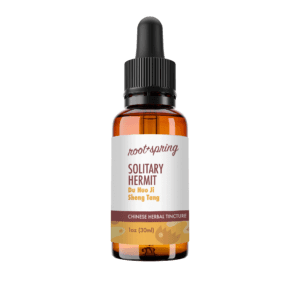 Du Huo Ji Sheng Tang (Solitary Hermit) – Liquid Extract (Tincture)
Du Huo Ji Sheng Tang (Solitary Hermit) – Liquid Extract (Tincture)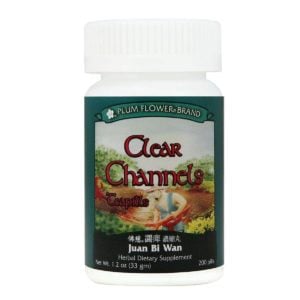 Plum Flower – Clear Channels (Juan Bi Wan)
Plum Flower – Clear Channels (Juan Bi Wan)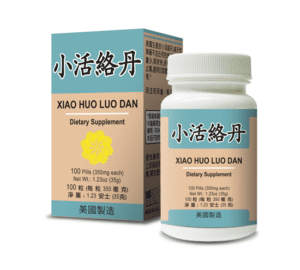 Xiao Huo Luo Dan (Healthy Joint Combo) – by Lao Wei
Xiao Huo Luo Dan (Healthy Joint Combo) – by Lao Wei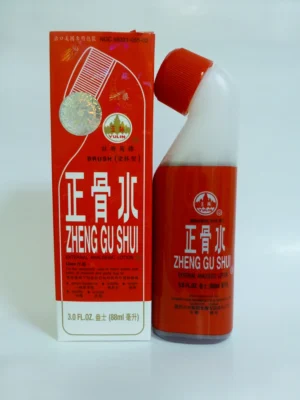 Zheng Gu Shui (w/applicator brush) – Yulin Brand
Zheng Gu Shui (w/applicator brush) – Yulin Brand